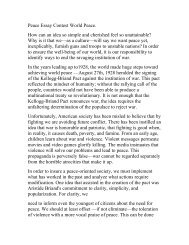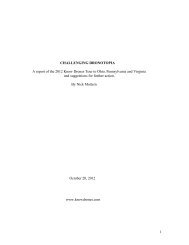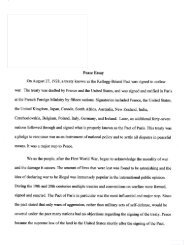US Training of Death Squads in Iraq? - War Is A Crime .org
US Training of Death Squads in Iraq? - War Is A Crime .org
US Training of Death Squads in Iraq? - War Is A Crime .org
You also want an ePaper? Increase the reach of your titles
YUMPU automatically turns print PDFs into web optimized ePapers that Google loves.
This year's Democratic primaries and the general election will be key tests <strong>of</strong> whether the U.S.citizenry will be will<strong>in</strong>g to challenge the bipartisan support for the <strong>Iraq</strong> <strong>War</strong>, the doctr<strong>in</strong>e <strong>of</strong>preventive war, and the exaggerated claims <strong>of</strong> foreign strategic threats brandished to frighten thepopulace <strong>in</strong>to support<strong>in</strong>g war. Scores <strong>of</strong> U.S. representatives and senators who voted <strong>in</strong> October2002 to authorize the <strong>in</strong>vasion <strong>of</strong> <strong>Iraq</strong> are up for re-election this year, and most <strong>of</strong> them stillsupport fund<strong>in</strong>g the war. If the majority <strong>of</strong> these pro-war Republican and Democratic lawmakersare re-elected, it will signal Wash<strong>in</strong>gton politicians that the grow<strong>in</strong>g grassroots opposition to thewar will not threaten their political careers. Despite the message it would send, some leaders <strong>in</strong>the peace movement are <strong>in</strong>sist<strong>in</strong>g that progressives work to re-elect pro-war members <strong>of</strong>Congress, <strong>in</strong>clud<strong>in</strong>g those who lied about <strong>Iraq</strong> still hav<strong>in</strong>g WMDs, simply because they areDemocrats. Such a strategy will virtually guarantee many more years <strong>of</strong> death and destruction <strong>in</strong><strong>Iraq</strong>, and- as the 2004 presidential election showed us- such Democrats will probablyend up los<strong>in</strong>g anyway.But a determ<strong>in</strong>ed citizenry is the decisive factor. The anti-Vietnam <strong>War</strong> movement, the antiapartheidstruggle, the nuclear freeze campaign, and Central America solidarity effortsdemonstrated that the particular <strong>in</strong>dividuals or party that the American people elect are lessimportant than the choices we give them. As the old adage goes, “If the people lead, the leaderswill follow.”The United States will eventually have to leave <strong>Iraq</strong>. The question is, how many Americans and<strong>Iraq</strong>is will have to die <strong>in</strong> the meantime? For the United States to pull out, Bush and his bipartisangroup <strong>of</strong> supporters would have to recognize that they cannot Americanize <strong>Iraq</strong>, establish U.S.hegemony <strong>in</strong> the Persian Gulf region, control <strong>Iraq</strong>'s vast oil reserves, or <strong>in</strong>timidate other nationsby subdu<strong>in</strong>g an <strong>in</strong>tractable <strong>in</strong>surgency. In short, the leadership <strong>of</strong> the greatest militarysuperpower the world has ever known would be forced to accept a humiliat<strong>in</strong>g retreat.It may be unrealistic to believe that the Bush adm<strong>in</strong>istration would simply pull out <strong>of</strong> <strong>Iraq</strong> even<strong>in</strong> the face <strong>of</strong> grow<strong>in</strong>g popular opposition. The Nixon adm<strong>in</strong>istration was unwill<strong>in</strong>g to simplypull out <strong>of</strong> Vietnam. However, the anti-war movement forced Wash<strong>in</strong>gton to negotiate with theSouth Vietnamese resistance and their North Vietnamese allies, which eventually led to thewithdrawal <strong>of</strong> U.S. forces. Demand<strong>in</strong>g negotiations that <strong>in</strong>clude a timetable for a total U.S.withdrawal may be the most realistic strategy that today's anti-war movement could advocate.Otherwise, President Bush will likely hold firm and leave the pa<strong>in</strong>ful decisions to a Democraticsuccessor, who would then take the blame for not “f<strong>in</strong>ish<strong>in</strong>g the job.” This is why it is soimportant for Democrats to stop fund<strong>in</strong>g the war and to <strong>in</strong>sist that President Bush negotiate asettlement to withdraw U.S. forces before he leaves <strong>of</strong>fice, thereby accept<strong>in</strong>g full responsibilityfor the consequences.Another question is, what will the United States learn from all this? Will it be just a tactical,stylistic precept that <strong>in</strong> the words <strong>of</strong> 2004 Democratic presidential nom<strong>in</strong>ee JohnKerry the war aga<strong>in</strong>st <strong>Iraq</strong> was not a mistake but rather that “the way the president went towar is a mistake”? The next time the United States <strong>in</strong>vades and occupies another country, shouldit be done the “right way” by a Democratic adm<strong>in</strong>istration?149








